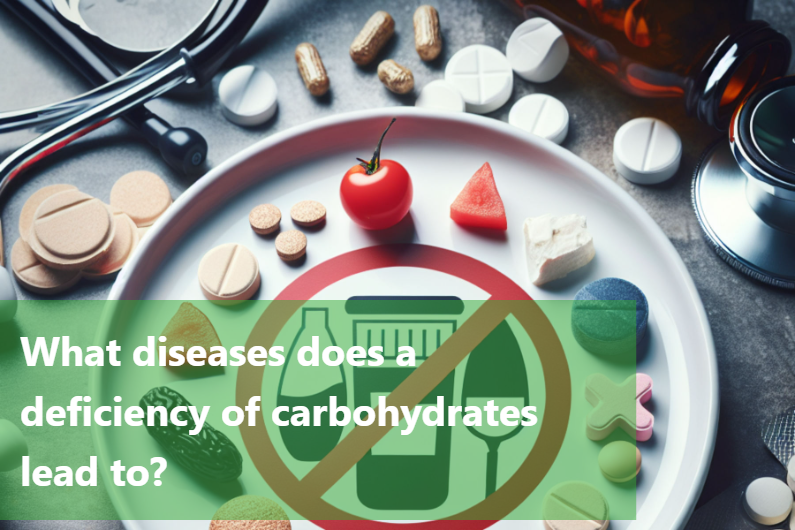
What diseases does a deficiency of carbohydrates lead to?
Carbs are a key part of our daily diet, providing vital energy for our bodies. Found in breads, fruits, veggies, and more, carbs keep us active and sharp.
If we don't get sufficient carbs, it can cause carb deficiency. This isn't about trendy diets - it's understanding how crucial carbs are for health. Let's explore why carbs matter, their role in our bodies, and how lacking them impacts us.
By looking into the details of this essential nutrient, we'll uncover the importance of carbs beyond fads. They’re a fundamental piece of a balanced diet and overall wellbeing.

Functions of Carbohydrates in the Body
Carbs are like the busy workers making our body go. They're mainly here to give us energy. When we eat carbs, our stomach turns them into glucose, a quick energy source for our muscles and organs.
Besides giving us a boost, carbs also help our cells work well. They play a part in making cell walls and help cells talk to each other. This helps all the body processes run smoothly. Carbs also help keep our organs and systems healthy.
Surprisingly, carbs are the main fuel for our brain. The glucose from carbs goes to the brain, keeping our thinking sharp. If we don't eat enough carbs, our brain might not work as well, affecting concentration and overall brain function.
To sum it up, carbs aren't just for energy – they're the unsung heroes making sure every part of our body works its best. Their many jobs make them crucial for our overall health.
Types of Carbohydrate Deficiency Diseases
Ketosis: A metabolic state where the body uses fat for energy due to insufficient carbohydrate intake, leading to the production of ketones.
Hypoglycemia: Low blood sugar levels caused by inadequate carbohydrate consumption, resulting in symptoms such as dizziness, confusion, and weakness.
Ketoacidosis: A potentially life-threatening condition where ketone levels in the blood become dangerously high, often associated with uncontrolled diabetes or prolonged fasting.
Muscle Wasting: Inadequate carbohydrate intake can lead to the breakdown of muscle tissue to provide energy, impacting physical strength and endurance.
Impaired Cognitive Function: Carbohydrates are essential for brain function. A deficiency can result in cognitive impairment, including difficulty concentrating and memory problems.
Electrolyte Imbalance: Carbohydrates help regulate electrolyte balance. A deficiency can lead to disturbances in electrolyte levels, affecting muscle function and hydration status.
Reduced Immune Function: Carbohydrates are necessary for optimal immune system function. A deficiency can weaken the immune response, increasing susceptibility to infections.
Digestive Issues: Insufficient fiber intake from carbohydrates can lead to digestive problems such as constipation and irregular bowel movements.
Energy Deficiency: Carbohydrates are the body's primary source of energy. A deficiency can lead to fatigue, weakness, and overall decreased physical performance.
Long-Term Health Risks: Prolonged carbohydrate deficiency can increase the risk of chronic diseases such as cardiovascular disease, diabetes, and metabolic disorders.
Sources of Carbohydrates in the Diet
Carbohydrate Source |
Description |
|---|---|
Grains |
Bread, rice, oats, quinoa, barley |
Legumes |
Beans (black beans, kidney beans, chickpeas), lentils |
Starchy Vegetables |
Potatoes, sweet potatoes, corn, squash |
Fruits |
Apples, bananas, oranges, berries, mangoes |
Dairy |
Milk, yogurt, kefir |
Sugars |
Table sugar, honey, maple syrup, agave nectar |
Whole Grains |
Whole wheat, brown rice, whole oats, whole grain bread |
Processed Grains |
White bread, white rice, pasta |
Vegetables |
Broccoli, carrots, spinach, kale, bell peppers |
Nuts and Seeds |
Almonds, walnuts, chia seeds, flaxseeds |
Processed Foods |
Cereals, snack bars, pastries, cookies |

Diseases Linked to Insufficient Carbohydrate Intake
It's crucial to highlight the importance of having enough carbohydrates for good health. Carbs are like the silent heroes that power our daily activities, help our cells work, and are the main energy source for our brain.
If we don't get enough carbs, it can lead to problems like low blood sugar, ketosis, stomach issues, and a weaker immune system. It's clear that ignoring this vital nutrient can have serious effects.
To keep a balanced and healthy diet, try to include different sources of carbs. Whole grains, fruits, veggies, legumes, and dairy products all have unique nutrients that contribute to your overall well-being. Choose complex carbs for lasting energy, and be mindful of what you eat to support good digestion.
Remember, the aim isn't to make carbs seem bad, but to make smart and balanced choices. By doing this, you can enjoy the benefits of steady energy, a well-working brain, and overall good health. Let's appreciate the important role carbs play in keeping us healthy and make thoughtful choices to fuel our bodies for an active and lively life.
This Blog post is an initiative by Lo! Foods, to provide accurate and Nutritionist / Doctor approved information related to Health. Lo! Foods is India's leading brand for Everyday Functional Foods. Foods designed for specific Health conditions or Needs. Lo! Foods also runs India's largest range of Low Carb Healthy Cloud Kitchens, under the brand names of Lo!, ProteinChef, ATH (All Things Healthy) and DiabeSmart.













Leave a comment
Your email address will not be published.